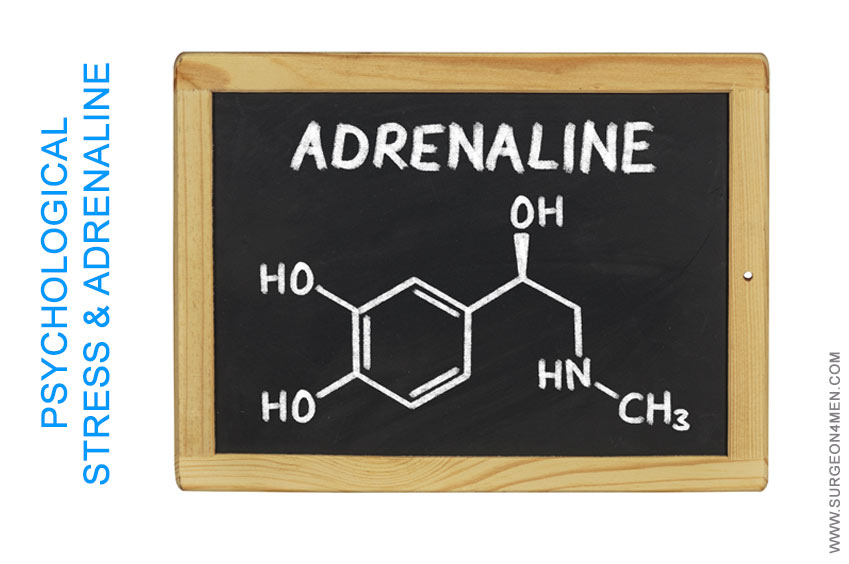Psychological Stress & Adrenaline
Stress can be defined as the response mechanism of our body to a threat situation wherein in our body feels that it is not well equipped to cope up with the consequences. When our body perceives any kind of danger, it immediately prepares for a ‘fight or flight’ reaction to the situation. The stressor can be any form of stimulus that can cause stress. Typical examples of stressors include death of a loved one, exam, divorce, loss of a job, etc. The stress response is a defensive mechanism of our body to protect itself. Stress helps our body to stay focused, alert and energetic. Typical symptoms of psychological stress include anxiety, moodiness, depression, heart disease, sleep disorder, weight gain, and memory and concentration impairment.
Stress Situation

The moment our body encounters a physiological stress situation, it tries to judge whether the situation is stressful. The decision is typically taken on the basis of sensory inputs and stored memories. The sensory inputs are the things that we hear, feel, or see. Once the body decides that it is a stressful situation, it activates the hypothalamus gland which is located at the lower base region of the brain. The hypothalamus gland triggers the response of the stress to the adrenal medulla and the pituitary gland. The short term responses to stress situations are produced by the Sympathetic Medullary System whereas long term response to stress situations are produced by the Hypothalamic Pituitary Adrenal system.
The Sympathetic Medullary System
The Sympathetic Medullary system (SAM) comes into play when our body is subjected to short term acute stress. The hypothalamus gland tends to activate the adrenal medulla gland which is a part of the autonomic nervous system of our body. On being activated, the adrenal medulla secretes the adrenaline hormone which prepares our body for a fight or a flight response to the threat that is being encountered. A physiological reaction to the secretion of the adrenaline hormone is that the heart rate increases. Other reactions include a decrease in digestion and an increase in pulse, blood pressure, and sweating. Adrenaline also activates the sympathetic nervous system of our body and reduces the activity of the parasympathetic nervous system. Once the perceived threat fades away, the sympathetic nervous system comes into play and tries to bring the body to its initial state.
The Hypothalamic Pituitary-Adrenal (HPA) System
 The Hypothalamic Pituitary-Adrenal (HPA) System comes into play when our body is subjected to a long term chronic stress situation. When the hypothalamus gland observes the presence of a long term continuing stressor, it stimulates the pituitary gland which starts to secrete the adrenocorticotropic hormone (ACTH). The ACTH in turn starts to stimulate the adrenal glands to secrete the corticosteroid hormone, commonly known as cortisol. Cortisol plays a vital role in increasing the availability of body’s fuel supply in terms of carbohydrates, fats, and glucose levels. These are needed by the body to respond to the stress situation. However, if the body’s cortisol levels remain at an elevated level for a long duration of time then it can lead to a breakdown of the muscles. This can lead to delays in inflammatory responses and a suppression of the body’s immune system.
The Hypothalamic Pituitary-Adrenal (HPA) System comes into play when our body is subjected to a long term chronic stress situation. When the hypothalamus gland observes the presence of a long term continuing stressor, it stimulates the pituitary gland which starts to secrete the adrenocorticotropic hormone (ACTH). The ACTH in turn starts to stimulate the adrenal glands to secrete the corticosteroid hormone, commonly known as cortisol. Cortisol plays a vital role in increasing the availability of body’s fuel supply in terms of carbohydrates, fats, and glucose levels. These are needed by the body to respond to the stress situation. However, if the body’s cortisol levels remain at an elevated level for a long duration of time then it can lead to a breakdown of the muscles. This can lead to delays in inflammatory responses and a suppression of the body’s immune system.
References:
- “Sympathetic-Adrenal and Pituitary-Adrenal Response to Challenge,” by Marianne Frankenhaeuser, et al. Published in 1985, accessed on 27 April 2015. Retrieved from: http://dx.doi.org/10.1007/978-1-4684-8329-1_104

